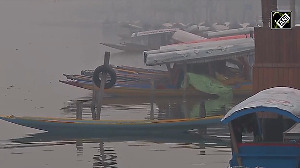India should not have a large bilateral military training program in Afghanistan in the future because that would predictably exacerbate tensions, says Director of Research, Brookings Institution, Michael O’Hanlon.
 India needs to be more flexible in its involvement in Afghanistan and not exacerbate Pakistan’s paranoia, Michael O’Hanlon, one of the leading American policy wonks on Afghanistan, argued.
India needs to be more flexible in its involvement in Afghanistan and not exacerbate Pakistan’s paranoia, Michael O’Hanlon, one of the leading American policy wonks on Afghanistan, argued.
O'Hanlon served as an adviser to the United States military hierarchy directing the war on terror in Afghanistan, and is director of research, Brookings Institution.
He agreed that “we should not be portraying Afghanistan’s current problems as due to Indo-Pak rivalry. I like to associate myself with the view that India has not been a culprit. But having said that…some degree of flexibility in its (India’s) presence in Afghanistan is worth keeping in mind.”
“For example, I don’t think India should have a large bilateral military training program in Afghanistan in the future because that would predictably exacerbate tensions,” he said.
It would not be India’s fault, O’Hanlon acknowledged, “but we know how Pakistan could easily react to that. I also think it is best now that India has emphasised more of its efforts in the center north and west -- of course, that has its own dangers because Pakistanis would say you are just helping your Northern Alliance friends and don’t care about Afghanistan writ large.”
“On the other hand, if you have to balance between the concerns that Pakistanis will see in an Indian presence in the south and east somehow as a cover for helping insurgencies within Pakistan, we have to be sensitive to that.”
“Again, it’s not India’s fault that Pakistan feels that way, and I won’t get into the broader issues of the Indo-Pakistani relationships, but narrowly on this issue, you have to be sensitive to the kinds of reactions that,” said O’Hanlon.
India should not also fear, he said, “the US will be encouraged to reach a deal with the Taliban and that they (the Taliban) will be allowed to control large swaths of the southern region.”
Lisa Curtis, senior research fellow at the conservative Heritage Foundation and head of that Washington, DC think tank’s South Asia program, asserted that there is absolutely no reason why the US should give in to Pakistan’s paranoia.
She told India Abroad how taken aback she was, when “shortly after the fall of the Taliban, officials in the Bush administration considered asking India to close down its consulate in Jalalabad in order to placate Pakistan.”
“This seemed an illogical policy decision since the US was asking a friend that shared our same counter-terrorism objectives to decrease its influence in Afghanistan in order to appease the country that had directly undermined US interests by supporting the Taliban.”
Curtis agreed with O’Hanlon that the zero-troop option would be a disaster. “While this may have been a negotiating tactic to try to convince (Afghanistan president Hamid) Karzai to rejoin the bilateral security talks, it was unwise to put this option out there at all,” she said.
“The zero option is the Taliban dream option. An abrupt draw-down would pave the way for the Taliban to regain influence and cripple the US ability to conduct counter-terrorism missions in the region.”
She argued, “The problem with trying to use the zero option as a bargaining chip is that the Afghans already believe the US will cut and run, similar to the way we turned our backs on them over two decades ago when the Soviets left. Putting this idea out there only confirms what they already believe and fuels hedging behavior.”
The zero option discussion stems from tensions between the Obama and Karzai administration over the opening of the Taliban office in Doha. The US administration blundered by sending a delegation to Doha to meet with the Taliban leadership without the presence of the Afghan government. The move seemed to be playing into the hands of the Taliban whose long-sought objective is to cut the Karzai administration out of any talks.’
On Islamabad, she said, ‘The US the will have to determine whether the Pakistan military is willing to help stabilize Afghanistan or whether it is persisting in playing a spoiler role.’
She pointed out, “There continues to be close ties between the Pakistan military and the Haqqani Network that attacks coalition and Afghan forces.”
She recommended that “as part of a carrot and stick approach, the US should strengthen conditions on security aid to Pakistan based on its willingness to crack down on the Haqqani Network. If Pakistan continues to resist US calls for a crackdown on the Haqqanis, the US should reduce Coalition Support Funding for Pakistan.”
Pakistan has received over $10 billion in CSF over the last decade. The Fiscal Year 2014 National Defense Authorisation Act legislation that passed the House in early June limits reimbursement of CSF for Pakistan pending certification of certain Pakistani actions, including operations against the Haqqani network.
“Hopefully,” Curtis said, “this language will stay in the final bill.”










